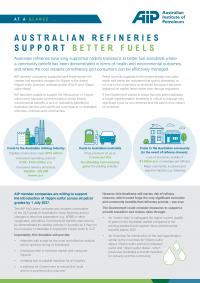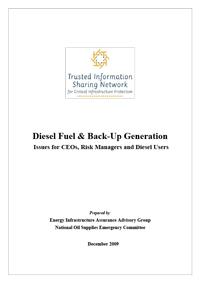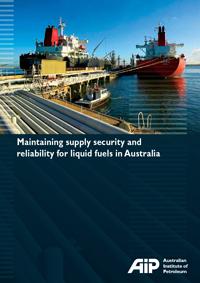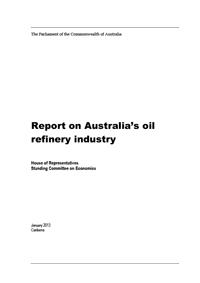Resources

Date
Description
Australian refineries have long supported orderly transitions to better fuel standards where a community benefit has been demonstrated in terms of health and environmental outcomes, and where the cost impacts on refineries and consumers can be effectively managed.
Date
Description
This paper has been developed by the Department of Resources, Energy and Tourism in consultation with NOSEC, the Energy Infrastructure Assurance Advisory Group (EIAAG) and AIP. The paper provides information and general advice on the issues organisations should be aware of to ensure that back-up…
Date
Description
AIP has produced a new publication – Maintaining Supply Security and Reliability for Liquid Fuels in Australia – which provides a factual overview of the liquid fuels market and supply chain in Australia. It also details the key factors influencing the secure and reliable supply of liquid fuels to…Date
Description
The NOSEC is a committee of the Ministerial Council on Energy (MCE) and provides the main executive channel through which Commonwealth and State Governments formulate their overall management response to a national liquid fuel emergency. The task of the NOSEC is to ensure that the Federal…Date
Description
There is an extensive range of Federal, State/Territory and Local government regulations and legislation applying to refineries and businesses operating in the downstream petroleum industry. Some of the key regulations are outlined below. Formal Price Monitoring On 17 December 2007, under…Date
Description
Transport fuel imports do not increase risk for supply reliability and security A diversity of global supply sources and local import facilities provide a range of options for Australia. Australia is already dependent on imports to meet the growth in demand for transport fuels (eg. demand…Date
Description
Relying on shipping (for imports) does not increase security risks, and shipping lanes are not easily disrupted. Most countries are reliant on movements of petroleum (crude and product) within and between countries, and particularly so for Australia (in both an export and import sense).…Date
Description
AIP member companies provide very reliable supplies of fuel to the Australian market and: represent around 90% of primary fuel supply to the Australian market, have decades of operational experience in Australia and Asia delivering high quality fuel to customers, have major…
Date
Description
On 5 February 2013 the House of Representatives Standing Committee on Economics tabled its Report on 'Australia's Oil Refinery Industry', following the Committee's inquiry in 2012. The Inquiry was conducted in relation to claims and concerns being raised about the viability of Australia's oil…Date
Description
Liquid Fuel Supply Security and Reliability The Australian liquid fuel supply chain has considerable span and diversity. It includes crude and petroleum product shipments into and around Australia, refinery throughput, bulk fuel storage tanks, extensive terminal and distribution networks, over…